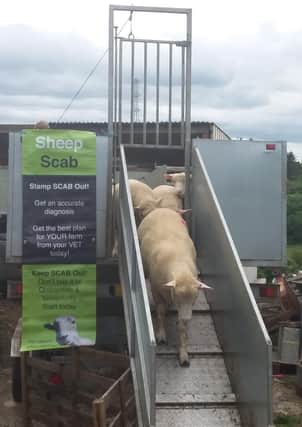NI sheep scab survey project


The survey is being conducted by veterinarian Paul Crawford who grew up in Islandmagee where he kept sheep on his family small-holding.
On graduating from the Royal Veterinary College (RVC) in London 1998, he worked in academic and private practice on the mainland while undertaking an RCVS Certificate in Veterinary Anaesthesia.
Advertisement
Advertisement
Returning to Northern Ireland, he worked as a self-employed vet focusing on anaesthesia (clinical and research) in addition to first opinion work. Paul also found time to serve as President of the Association of Veterinary Surgeons Practicing in Northern Ireland (AVSPNI) while continuing his work as a sheep farmer.
The Department for Agriculture, Environment and Rural Affairs (DAERA) advertised a fully funded PhD project on sheep medicine in Northern Irish flocks this time last year. Paul said a long held interest in sheep and the ending of a previous business meant “I didn’t hesitate to apply.”
The prospect of getting paid to talk and read about sheep for three years wasn’t to be missed. The initial expectation was that the student would be based full time on the mainland. This didn’t suit Paul, who was due to get married in 2020 and wanted to remain in Northern Ireland with his wife. Nor did it make sense to move to the mainland to study sheep and sheep farming in Northern Ireland.
Paul explained: “I managed to convince the supervisors that the best place to conduct a PhD focusing on sheep medicine in Northern Ireland was actually in Northern Ireland itself. And that I, as a forty-something year old vet who’s undertaken contract research for years, was the person to do it – from home.”
Advertisement
Advertisement
The supervisors agreed he could work remotely and the wheels were set in motion. Then Covid-19 arrived, and everyone else joined Paul working from home! Paul still hasn’t set foot on the Harper Adams University campus where his supervisor, Phillip Robinson is based.
The PhD will focus on improving stewardship of medicines on Northern Ireland sheep farms. A number of phases will be rolled out over the next two and a half years. The overall concept of improving stewardship and the health and welfare of the flock is more important than simple arithmetic reductions in total medicines used.
“There’s very little UK wide research currently published on the amount and type of medicines used in sheep flocks and even less specifically in relation to Northern Ireland, so I hope my work will go some way to redressing the balance.”
Phase one will see Paul strive to get a clearer picture of the medicines used on farms in Northern Ireland via an online survey and farmer interviews.
Advertisement
Advertisement
“The survey will focus on sheep scab which is an endemic problem in sheep in Northern Ireland that causes significant welfare issues to flocks. It also causes no small measure of stress to the farmers in terms of economic damage to their business and damage to their mental health,” Paul said.
“I now need help recruiting sheep farmers to complete the survey, whether they have one sheep or a thousand and regardless of if they see scab every year or if they’ve never seen it. It’s vitally important we reach all types of sheep farmer; from the full-time sheep only farmer and those with mixed farms which include some sheep, to those with small pedigree flocks and ‘hobby’ farmers with only a few sheep.”
Paul will then move on to interview farmers and vets to establish how and why antimicrobial medicines are used on farms, how such decisions are reached and how their use is recorded.
Phase two will consist of a series of in-depth discussions with a subset of farmers, looking at their perception of flock health and how they might improve medicine stewardship. The farmers will work in conjunction with their vet to draw up a plan to improve stewardship, which they’ll follow for between twelve and eighteen months. Progress will be tracked via repeat interviews. The final phase will consist of a series of knowledge exchange activities where findings will be mdiscussed and disseminated.
Advertisement
Advertisement
But before that can happen, the first phase needs to be completed and that’s where you come in. Paul said: “Please take 10 minutes, now, to complete the survey. It will be a small step forward in getting control of this insidious problem among our sheep.”
To participate in the survey, visit: https://harper-adams.onlinesurveys.ac.uk/ni-sheep-scab-survey